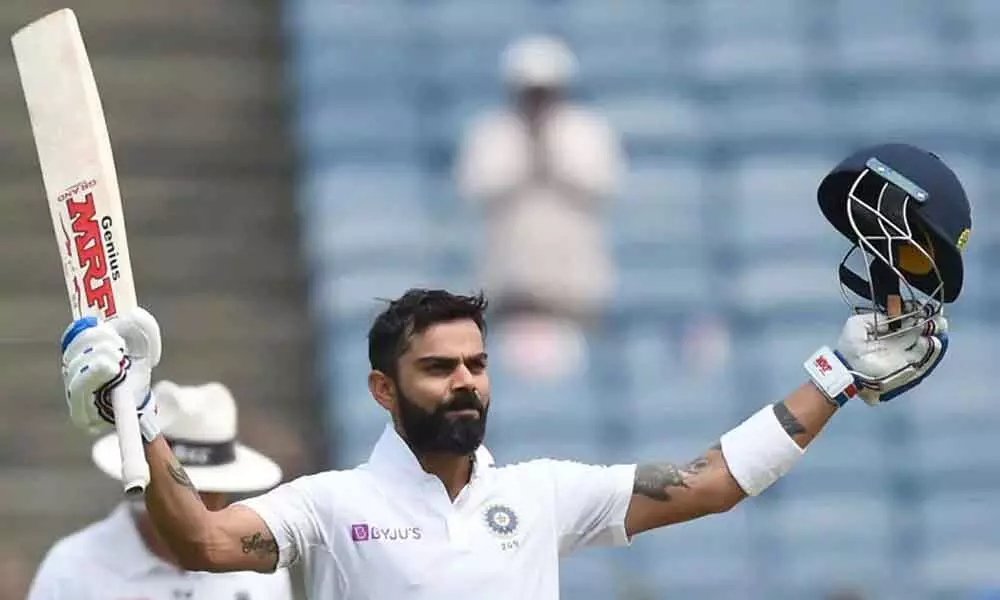Live
- STEM hiring to rise by 15-20 pc by 2027: Report
- UK Regulator Accuses Apple and Google of Stifling Mobile Browser Competition
- Tamil Nadu CM Stalin Invites Telangana CM Revanth Reddy for Meeting on Delimitation Impact
- Essential career tips for freshers
- Tips to avoid unnecessary mistakes while studying abroad
- Holi Festival: Liquor Outlets to Remain Closed for Holi in Hyderabad
- iQoo launches Neo 10R model
- Hyderabad: Woman Alleges Caste-Based Harassment by Roommates in Shaikpet
- Markets end on flat note
- Nifty Metal index falls after US tariffs
Virat Kohli: You do not need to be a captain to be the leader


Virat Kohli (File Photo)
- Virat Kohli captained India across seven years
- He recently quit Test captaincy after India lost a series in South Africa
- Rohit Sharma has been named India's new white-ball captain
Virat Kohli has said understanding the right time to move on is a part of leadership and he always thought as a captain even when he was just a player in the Indian team.
Earlier this month, following India's loss 2-1 loss in the Test series in South Africa, Kohli quit Test captaincy. That saw the end of Kohli's tenure of seven years as the Indian cricket team's captain.
Last month, Kohli was informed that he was no longer the One-Day International (ODI) skipper of Team India. That came after he had stepped down from the Twenty2o International (T20I) captaincy. It is understood that the Board of Control for Cricket in India (BCCI) selectors wanted just one captain for white-ball formats. Rohit Sharma was named Kohli's successor in the limited-overs.
"See, I think firstly you need to have a complete understanding of what you set out to achieve and whether you have achieved those targets or not. Everything has a tenure and time period, so you have to be aware of it. As a batter, you might be able to give more to the team, so take pride in that," said Kohli on an episode of 'Fireside Chat with VK'.
Kohli took charge of India first when MS Dhoni suddenly announced Test retirement in December 2014. Three years later, Dhoni passed on the baton to Kohli in the limited-overs as well but continued to be a part of Team India just as a player. Dhoni went on to represent India until 2020 when he brought curtains down on his celebrated career.
"You do not need to be a captain to be the leader. When MS Dhoni was in the team, it was not like he was not the leader, he was still the guy from whom we wanted to have inputs. To win or not win is not in your hands, the striving for excellence and to be better every day, is not something you can do short term. When it comes to a culture, it will last beyond your playing years and your responsibility," added Kohli.
Further talking about his viewpoint, Kohli said: "To add to that, moving on is also a part of leadership, to understand the right time to do that. I think one has to embrace all kinds of roles and opportunities. I have played under MS Dhoni for a while and then I became the captain, my mindset has been the same all this while. I always thought like a captain when I was just a player in the team."
Kohli is easily the most successful Test captain India have ever had. He captained the most number of Tests among the other Indian captains (68) and won more matches than any other India captain (40). Under Kohli's captaincy, India suffered losses only in five out of the 24 series. Kohli-led India triumphed in 16 out of their 36 overseas Tests and had a fine win percentage of 44.44 - the highest for an Indian or Asian skipper who has led their side in at least 10 Tests.
"I think, it is very important to be aware of what you think about yourself. At the end of the day, if you have more responsibility, you know you can have a different vision so you need to stay true to yourself. If I know my game is not where it should be, then I do not need someone to push me, I am myself aware of it.
"Communication is the most important thing, you cannot someone cut off saying I do not need your point of view, you can respectfully say I am in a good space and if there is help to be taken, then I will reach out to you. That sort of balance has worked out for me," Kohli explained further.
Virat Kohli: Culture is more important than strategy
Opening up on the team culture within the Indian cricket team, Kohli said," Culture is a very difficult thing to change but I have experienced in any field in India it is important to set the culture from the top and that is how things have had an impact in our society. When I became the captain, my focus was on cultural change.
"I knew we do not lack in skill, I was thinking about maximizing the talent to its potential. I wanted to not confine my vision and if you want to expand it, then you need culture. Culture requires you to work hard every day. It is a constant process, culture is more important than strategy. As a captain, I was more focused on trying to bring in a culture of we are capable of winning from anywhere," the 33-year-old batsman added.
India are next set to host West Indies in a six-match series, including three ODIs and as many T20Is. The series will begin on Feb. 6. While the ODIs will be played at Narendra Modi Stadium, Ahmedabad, the T20Is will be held at Kolkata's Eden Gardens.

© 2025 Hyderabad Media House Limited/The Hans India. All rights reserved. Powered by hocalwire.com






